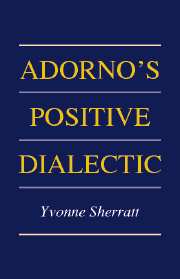Book contents
- Frontmatter
- Contents
- Preface
- Abbreviations
- Adorno's Positive Dialectic
- General Introduction
- PRELUDE TO ADORNO'S POSITIVE DIALECTIC
- Prelude I: Adorno's Intellectual Tradition: German Philosophy
- Prelude II: Adorno's Intellectual Tradition: Sigmund Freud
- ADORNO'S POSITIVE DIALECTIC: INTRODUCTION
- PART I NEGATIVE THESIS: THE DECLINE OF ENLIGHTENMENT
- PART II POSITIVE THESIS: THE REDEMPTION OF ENLIGHTENMENT
- Bibliography
- Index
General Introduction
Published online by Cambridge University Press: 10 August 2009
- Frontmatter
- Contents
- Preface
- Abbreviations
- Adorno's Positive Dialectic
- General Introduction
- PRELUDE TO ADORNO'S POSITIVE DIALECTIC
- Prelude I: Adorno's Intellectual Tradition: German Philosophy
- Prelude II: Adorno's Intellectual Tradition: Sigmund Freud
- ADORNO'S POSITIVE DIALECTIC: INTRODUCTION
- PART I NEGATIVE THESIS: THE DECLINE OF ENLIGHTENMENT
- PART II POSITIVE THESIS: THE REDEMPTION OF ENLIGHTENMENT
- Bibliography
- Index
Summary
Theodor Adorno is one of the most exciting, controversial, difficult, and misrepresented philosophers of the twentieth century. This book hopes to preserve the excitement and controversy whilst illuminating the difficulties and curbing some of the misrepresentation of his work. This monograph is devoted to the study of Adorno's notion of the particular dialectic that is known as the dialectic of ‘Enlightenment’ and is the title of one of Adorno's best-known texts, coauthored with Max Horkheimer.
After over fifty years of consistent study, two elements of Dialectic Of Enlightenment remain seriously neglected. The work is almost always read as a severe critique and unremittingly bleak view of ‘Enlightenment’; yet there exists a systematic utopian dimension to Adorno's thought which has yet to be fully interpreted and understood. Further, in spite of a wealth of research into Adorno's post-Kantian German philosophical inheritance, his important intellectual debt to Sigmund Freud, remarkably, still remains comparatively uncharted.
Adorno's Positive Dialectic fills in these two lacunae. First, we interpret Dialectic of Enlightenment and other key texts by Adorno to uncover the narrative of ‘Enlightenment's’ failure and the concomitant utopian story of its redemption. Second, we uncover the Freudian debt underlying Adorno's thesis about ‘Enlightenment’. We do so by depicting Adorno's German philosophical inheritance and the intersection of this with his appropriation of Freud. Expressed concisely, Adorno's Positive Dialectic conjoins German philosophy with Freud in order to offer an argument for a positive dialectic of ‘Enlightenment’ in Adorno's work.
- Type
- Chapter
- Information
- Adorno's Positive Dialectic , pp. 1 - 22Publisher: Cambridge University PressPrint publication year: 2002



